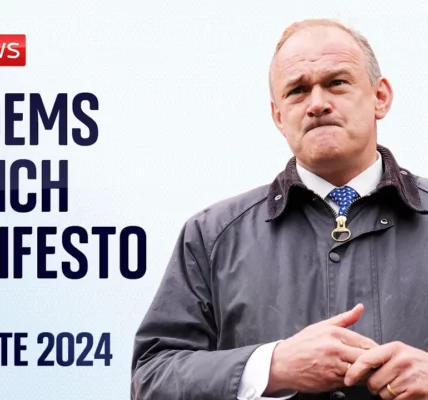In-Depth Discussion with Labor’s Shadow Minister Nick Thomas-Symonds

This article explores key insights from a conversation with Nick Thomas-Symonds, discussing pressing issues in UK politics including social care, the case of Julian Assange, and the rise of knife crime.
Introduction
The conversation with Nick Thomas-Symonds, Labor’s Shadow Minister without portfolio, sheds light on several critical issues facing the UK today. From social care challenges to the legal intricacies surrounding Julian Assange, and the alarming rise in knife crime, Thomas-Symonds articulately addresses the need for cross-party collaboration and a comprehensive approach to governance. This article delves into each of these topics, reflecting on the complexities and the human elements involved.
Social Care Challenges in the UK
Social care has increasingly become a pivotal issue in UK politics, highlighted by the heartfelt remarks from Ed Davey regarding his personal experiences as a caregiver.
The Human Element of Caregiving
During the discussion, Thomas-Symonds emphasized the emotional weight of caregiving, acknowledging the struggles faced by both paid and unpaid carers. He referred to them as “an army of heroes” who provide essential support out of love and dedication. This reflection resonates with many families across the nation, highlighting the need for a systemic change to support these individuals.
The Call for Cross-Party Support
Thomas-Symonds agreed with the notion that social care is too significant an issue for any single party to tackle alone. He pointed out that Labor is committed to working across party lines if they are fortunate enough to form a government.
- Establishing a national care service
- Creating a fair pay agreement for carers
- Setting national standards for care
These steps are essential for ensuring that caregivers receive the recognition and support they deserve, including realistic travel times between appointments, which is currently a significant issue.
The Julian Assange Case
Another pressing topic discussed was the recent developments in the Julian Assange case. Thomas-Symonds reiterated the importance of allowing the legal process to unfold without premature judgments.
The Legal Proceedings
With Assange reportedly out of Belmarsh prison, the discussion turned to the implications of his potential plea deal with the U.S. Department of Justice. Thomas-Symonds stressed that the legal system should treat Assange as it would any individual, ensuring fair representation throughout the process.
Public Perception of Assange
The conversation also touched on how Assange is viewed in public discourse—either as a hero for journalistic transparency or as a threat to national security. Thomas-Symonds maintained that these perspectives should not overshadow the necessity of a fair legal process.
Tackling Knife Crime
Knife crime remains a significant concern across the UK, particularly in urban areas like London. Thomas-Symonds discussed the alarming statistics and the urgent need for action.
The Rise in Knife Crime Statistics
With over 14,500 recorded knife crime offenses in London alone by December 2023, the figures are indicative of a larger national problem. Thomas-Symonds highlighted that this issue is not confined to London; areas such as Cleveland have seen knife crime rates double since 2015.
A Multifaceted Approach to Solutions
Addressing knife crime requires a comprehensive strategy that includes:
- Restricting access to dangerous weapons
- Implementing stringent online purchasing regulations
- Creating Young Futures hubs to support at-risk youth
- Promoting cross-government collaboration to address underlying causes
Thomas-Symonds argued that a unified approach is crucial to combat the escalating violence and to support families affected by these tragic incidents.
Conclusion
In conclusion, Nick Thomas-Symonds’ insights reveal the complex nature of contemporary issues facing the UK, from social care reforms to the pressing challenges of knife crime. His call for cross-party collaboration underscores the importance of unity in addressing these societal challenges. As the political landscape evolves, it remains imperative for leaders to prioritize the needs of their constituents and work together for effective solutions. For more insights on UK politics, visit our related articles on social care and crime prevention strategies.
“`




